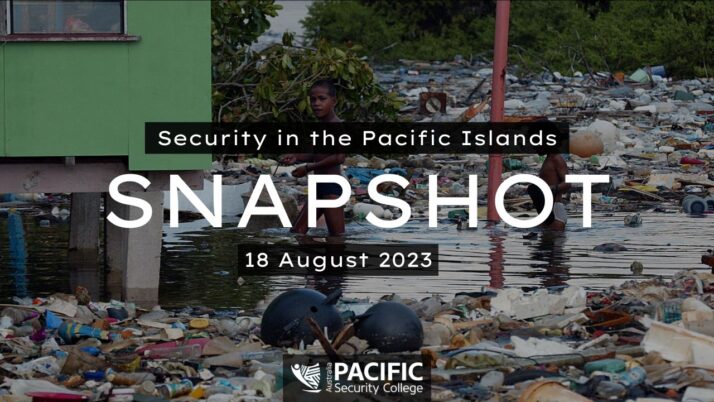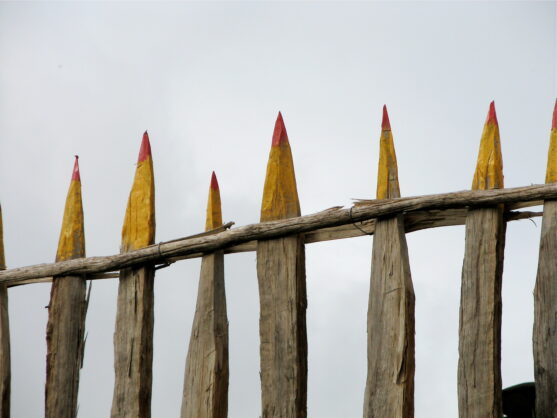Papua New Guinea must control its borders
Huli Fence Close-up
Henry Ivarature
Papua New Guinea has had its first cases of COVID-19, and faces numerous challenges to stop its spread. Sharing the only land border between Asia and the Pacific, the government must properly seal borders given the alarming rate of infections in neighbouring Indonesia, Henry Ivarature writes.
With a surge in COVID-19 cases predicted for Indonesia, the possibility of the dreaded virus entering Papua New Guinea (PNG) from West Papua Province is a real concern amongst observers and the government.
Two months ago, the Governor of West Sepik Province, Tony Wouwou, closed the PNG-Indonesia border post at Wutung in response to the COVID-19 outbreak in Wuhan, China. The Wutung border post is about 50 kilometres from the West Papua capital of Jayapura which has a population of about 314,000.
The border post is a very busy one, not only for people of greater Sepik but Indonesians and other nationalities travelling to and from Jayapura. PNG and Indonesian solders guard the border with the former also on the look-out for Papuan separatists, who have been waging a guerrilla war against Indonesia.
Despite its closure and further reinforced by a state of emergency in PNG, people continue to covertly cross the PNG-Indonesian border daily, into West Papua to sell vanilla beans and other produce. PNG’s Treasurer Ian Ling-Stucky described the vanilla trade “too dangerous for the nation”. The border posts lack health surveillance, monitoring and quarantine facilities so these daily illegal crossings could become an entry point for COVID-19 into PNG.
On 2 April 2020, Indonesia recorded 1,790 COVID-19 cases with 170 fatalities. But mathematic modelling experts in the United Kingdom caution the data as ‘understating the true scale of the infections due to low rate of testing and a high mortality rate’. They think as many as 34,300 people may be infected, ranking the country ahead of Iran. Because of the slow response to the outbreak, health experts say a surge in COVID-19 cases is expected, and could turn the country into a COVID-19 epicenter.
On 27 March the first recorded fatality of COVID-19 in Papua was reported in the city of Sorong, its westernmost city. The Papua region had three recorded cases of COVID-19 and 19 cases under surveillance on March 25. Of those under surveillance, nine people were in Jayapura and six were in Merauke, a West Papua town located some 80 kilometres away from Weam in the Morehead district of PNG’s Western Province. These numbers and a report from the Jakarta Post about Papua Province lacking medical equipment and testing kits, plus illegal crossings are troubling PNG leaders.
East Sepik’s Governor Allan Bird reckons the number of COVID-19 infections in Indonesia is frightening some Indonesians to flee from it. He is very worried about its consequence if it leads to an influx of Indonesians across the border. The porous nature of the 750 kilometre land boundary between Western Province in the south and West Sepik Province in the north, which is largely un-guarded is also of little assurance in keeping the virus out.
Moreover, authorities are unable to detect traditional crossers, smugglers, refugees, or guerrillas along the length of the border. As in the past, many West Papuans fleeing Indonesian rule, can easily cross into PNG. In 2018, confrontations between the West Papua Liberation Army and Indonesia’s security forces resulted in thousands of people being displaced. An estimated 10,000 West Papuans crossed over in 1984, and thousands more could be expected.
Papuans regularly cross the border at various points between Wutung in West Sepik and Daru in Western Province. Some cross into Kiunga and make their way as far as Lake Murray. Kiunga is the port town of the Ok Tedi gold and copper mine and capital of the Western Province.
On the outskirts of town is a small army base which is now closed and condemned as a health hazard by health authorities. Other facilities also condemned due to lack of maintenance and disagreements over funding responsibilities between the national and provincial authorities are the correctional services facility, the police barracks and the Daru General Hospital.
The village of Weam in the Morehead district is close to Merauke, a large town across the border in West Papua. Villagers frequently travel to Merauke to buy food and diesel fuel. The only establishment of note there is the Bensbach eco-tourism lodge which is frequented by tourists, anglers, and birdwatchers in an otherwise isolated and almost forgotten part of the country.
But reports of COVID-19 cases in Merauke and Jayapura and the fear of the virus crossing into PNG has had the government arrange for soldiers to be deployed to these border posts in Weam, Daru, Kiunga, Wutung and others. Other measures under the two month State of Emergency include the building of COVID-19 centres, and subjecting travellers from these areas to closer scrutiny, surveillance, monitoring, and tracing.
An indefinite ban on traditional border crossings remains in force. It applies to villagers in Western Province, Autonomous Region of Bougainville, and West Sepik Province. 11 Treaty villages from Daru and along the Kiwai villages have also been banned from crossing into the Torres Strait Islands since February 2020.
And let’s not forget, Daru is a hotspot for tuberculosis. It not only has the worst infection rate in PNG but the strand of tuberculosis in the region is also drug-resistant. It is not hard to imagine the devastation COVID-19 could wreak in the Western Province – on people with tuberculosis and others, especially with a general hospital that has been condemned as a health hazard.
The government has declared COVID-19 a national security crisis and has invested significantly in public awareness, tracing and testing suspected cases. It is aware of the poor capacity of the country’s health system to cope in a pandemic and is working with development partners to prepare facilities and equipment, train personnel, and prepare to deal with a COVID-19 outbreak.
The threat of COVID-19 entering PNG through the border with Indonesia is very high. The defence of the borders is a national government responsibility.
Going forward, maintaining an intensified long-term border surveillance and monitoring program along the border with Indonesia is critical. This means that the government’s COVID-19 budget must be availed to procure adequate supply of masks, gloves, medical and personal protection equipment.
It must fund coverage of testing the proposed sample of 1,000 people and perhaps consider province-wide rollouts of testing.
It must also fund awareness efforts to educate people on the dangers of this virus and on the importance of social distancing, personal hygiene, and avoiding crowds. It must fund the allowances of authorities on a timely basis. There has never been a time when the consequences of inaction could decide the fate of many Papua New Guineans.
The threat of COVID 19 entering from Indonesia is real, and not to be underestimated, and controlling the border is a crucial way to mitigate that threat.
Read more blogs by Dr Henry Ivarature here.
More Stories

Security Snapshot - 28 Mar 2024
Pacific Security Snapshot | 28 March 2024
Summary ➣ Heavy rains, floods, landslides and earthquakes batter the region ➣ Pacific submissions to the International Court of Justice (ICJ) on climate change responsibility ➣ Elections across the Pacific prompting changes to diplomatic relations and security arrangements ➣ Challenges for women in politics Climate Security Lives have been lost in PNG after a series…

Security Snapshot - 18 Aug 2023
Pacific Security Snapshot | 18 August 2023
The security stories shaping the region ➣ Pacific Resilience Facility endorsed at the Forum Economic Ministers Meeting ➣ The Pacific Climate Security Assessment Guide ➣ French President Macron visits Papua New Guinea and Vanuatu ➣ US Secretary of State and Secretary of Defence in the Pacific ➣ Bougainville eruption leaves 8,000 displaced Climate Security Ministers…







